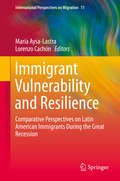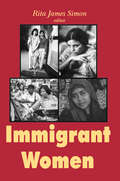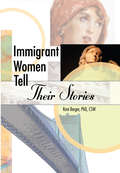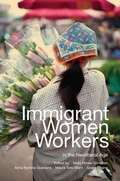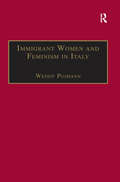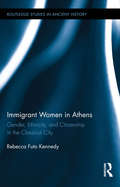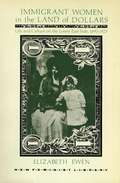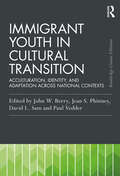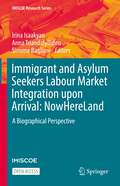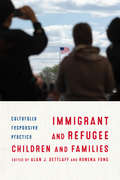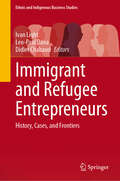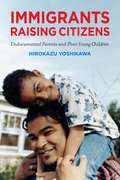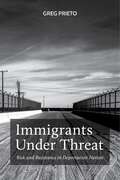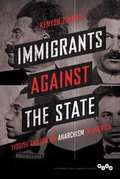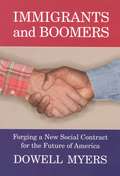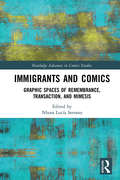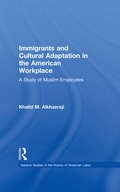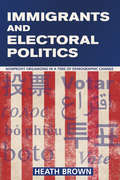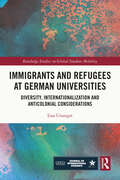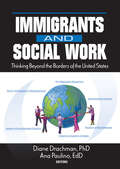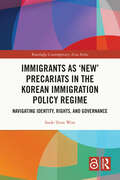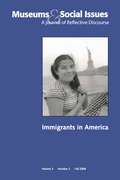- Table View
- List View
Immigrant Vulnerability and Resilience
by María Aysa-Lastra Lorenzo CachónThis book explores how the current sustained economic slow-down in North America and Europe has increased immigrant vulnerability in the labor market and in their daily lives. It details the ways this global recession has affected the immigrants themselves, their identities, as well as their countries of origin. The book presents an interdisciplinary dialogue as well as offer a transatlantic comparative perspective. It first focuses on the immediate effects of the Great Recession on immigrants' employment. Next, it connects the experience of immigrants in the labor market with their experiences in the social arena in receiving societies. Coverage also explores the effects of the economic downturn on transnational practices, remittances and return of Latin American migrants to their countries of origin. This volume will be of great interest to faculty and graduate students who are interested in international migration studies from the fields of sociology, economics, anthropology, geography, political sciences, and other social sciences. It will also be of interest to professionals and policy makers working on international migration policy and the general public interested on the topic.
Immigrant Women
by Rita J. SimonThe obstacles to assimilation and treatment of immigrant women are major issues confronting the leading immigrant-receiving nations today-the United States, Canada, and Australia. This volume provides a range of perspectives on the concerns, the sources of problems, how issues might be addressed, and the future of immigrant women. It is based upon a two-part issue of the journal Gender Issues, and contains a new introduction by the editor. The first section focuses on labor force experiences of women who have immigrated to the United States and Australia from Mexico and Latin America, Eastern Europe, Korea, the Philippines, India and other parts of Asia. Nancy Foner assesses the complex and contradictory ways that migration changes women's status. Cynthia Crawford focuses on Mexican and Salvadoran women who have recently moved into janitorial work in Los Angeles. M.D.R. Evans and Tatjiana Lucik analyze labor force participation of immigrants in Australia and family strategies of women migrants from the former Yugoslavia against the experiences of woman migrants from the Mediterranean world and other parts of the Slavic world. Economist Harriet Duleep reviews what is known as the family investment model. Monica Boyd tackles the controversial issue of the leading immigrant-receiving nations' unwillingness to declare gender an explicit ground for persecution and thus for gaining -refugee status. The second section deals with social class and English language acquisition, the obstacles women have had to overcome in gaining refugee status in the United States and Canada, and a comparison of movement patterns between different commentaries in Mexico and the United States on the part of Mexican male and female immigrants. Contributors include Suzanne M. Sinke, Katharine Donato, and Nina Toren. Immigrant Women will be valuable to researchers in women's studies, population demographics, as well as those teaching courses in sociology, history, and immigration. Rita James Simon is university professor in the School of Public Affairs at the Washington College of Law at American University. She is editor of Gender Issues and author of The American Jury, The Insanity Defense: A Critical Assessment of Law and Policy in the Post-Hinckley Era (with David Aaronson), Adoption, Race, and Identity (with Howard Altstein), In the Golden Land: A Century of Russian and Soviet Jewish Immigration, Social Science Data and Supreme Court Decisions (with -Rosemary Erickson), and Abortion: Statutes, Policies, and Public Attitudes the World Over.
Immigrant Women Tell Their Stories
by Roni Berger"I felt like an alien who fell down to earth, not understanding the rules of the game, making all the possible mistakes, saying all the wrong things." "Your whole life is in the hands of other people who do not always mean well and there is nothing you can do about it. They can decide to send you away and you have no control." "The moment I enter the house, I shelve my American self and become the 'little obedient wife' that my husband wants me to be." "The most difficult part is to find myself again. At the beginning I lost myself." This jargon-free book documents and analyzes the experience of immigration from the female perspective. It discusses the unique challenges that women face, offers insights into the meanings of their experiences, develops gender-sensitive knowledge about immigration, and discusses implications for the effective development and provision of services to immigrant women. With fascinating case studies of immigration to the United States, Australia, and Israel as well as helpful lists of relevant organizations and Web site/Internet addresses, Immigrant Women Tell Their Stories is for everyone who wants to learn or teach about immigration, especially its female face. "It was like somebody sawed my heart in two. One part remained in Cuba and one part here." Immigrant Women Tell Their Stories examines the nature of immigration for women through the eyes of those who have experienced it: how they perceive, interpret, and address the nature of the experience, its multiple aspects, the issues that it presents, and the strategies that immigrant women develop to cope with those issues. The women in this extraordinary book came from different spots around the globe, speak different languages and dialects, and their English comes in different accents. They vary in age as well as in cultural, ethnic, social, educational, and professional status. They represent a rainbow of family types and political opinions. In spite of their diversity, all these women share immigration experience. This book provides an understanding of the journeys they traveled and the experiences they lived to bring you new insights into what it means to immigrate as a woman and to frame effective strategies for working with-and for-immigrant women. "My father is the head of the house. When he decided to move to America [from India] my mother and us, the daughters, did not have much say. My mother and I were not happy at all, but it did not matter." Immigrant Women Tell Their Stories provides you with historical and global perspectives on immigration and addresses: legal, political, economic, social, and psychological dimensions of immigration and its aftermath deconstructing immigration by age, gender, and circumstances major issues of immigrant women-language, mothering, relationships and marriage, finding employment, assimilation (how much and how soon), loneliness, and more resilience in immigrant women immigration from a lesbian perspective guidelines for the development and delivery of services to immigrant women "You may say that I am the bridge, the desert generation that lost the chance to have it my way. But I will do my best to raise my daughters to have more choices than I." In this well-referenced book, immigrant women from Austria, Bosnia, Cuba, various parts of the former Soviet Union, Guatemala, India, Israel, Lebanon, Mexico, Pakistan, and the Philippines tell us their stories, recount what their experiences entailed and what challenges they posed, and teach us ways to help them cope successfully. "This was the best decision we could have made and the best thing we had ever done."
Immigrant Women Workers in the Neoliberal Age
by Grace Chang Maura Toro-Morn Anna Romina Guevarra Nilda Flores-GonzalezTo date, most research on immigrant women and labor forces has focused on the participation of immigrant women on formal labor markets. In this study, contributors focus on informal economies such as health care, domestic work, street vending, and the garment industry, where displaced and undocumented women are more likely to work. Because such informal labor markets are unregulated, many of these workers face abusive working conditions that are not reported for fear of job loss or deportation. In examining the complex dynamics of how immigrant women navigate political and economic uncertainties, this collection highlights the important role of citizenship status in defining immigrant women's opportunities, wages, and labor conditions. Contributors are Pallavi Banerjee, Grace Chang, Margaret M. Chin, Jennifer Jihye Chun, Héctor R. Cordero-Guzmán, Emir Estrada, Lucy Fisher, Nilda Flores-González, Ruth Gomberg-Munoz, Anna Romina Guevarra, Shobha Hamal Gurung, Pierrette Hondagneu-Sotelo, María de la Luz Ibarra, Miliann Kang, George Lipsitz, Lolita Andrada Lledo, Lorena Muñoz, Bandana Purkayastha, Mary Romero, Young Shin, Michelle Téllez, and Maura Toro-Morn.
Immigrant Women and Feminism in Italy (Research in Migration and Ethnic Relations Series)
by Wendy PojmannThe influx of female migrants to Europe has posed challenges to established European feminist movements. In this book the author assesses the significance of female immigration to Italy and its impact on Italian feminism by analyzing the way in which immigrant and Italian women have constructed their relationships over the past 30 years. The book provides comprehensive overviews of the Italian women's movement and the history of immigration to Italy before examining the formation of immigrant women's groups, the treatment of immigrant women by Italian women's associations, and the forging of new relationships in multicultural women's organizations. Broader comparisons on European migration are made to contextualize immigration to Italy and Southern Europe more generally. By drawing from a variety of research materials such as structured interviews, participant observation and empirical data, the book contributes to an interdisciplinary approach to the study of gender, migration and contemporary Italian history. The book is of interest for scholars and postgraduates in the fields of women and gender studies, migration studies and contemporary European history.
Immigrant Women in Athens: Gender, Ethnicity, and Citizenship in the Classical City (Routledge Studies in Ancient History)
by Rebecca Futo KennedyMany of the women whose names are known to history from Classical Athens were metics or immigrants, linked in the literature with assumptions of being ‘sexually exploitable.’ Despite recent scholarship on women in Athens beyond notions of the ‘citizen wife’ and the ‘common prostitute,’ the scholarship on women, both citizen and foreign, is focused almost exclusively on women in the reproductive and sexual economy of the city. This book examines the position of metic women in Classical Athens, to understand the social and economic role of metic women in the city, beyond the sexual labor market. This book contributes to two important aspects of the history of life in 5th century Athens: it explores our knowledge of metics, a little-researched group, and contributes to the study if women in antiquity, which has traditionally divided women socially between citizen-wives and everyone else. This tradition has wrongly situated metic women, because they could not legally be wives, as some variety of whores. Author Rebecca Kennedy critiques the traditional approach to the study of women through an examination of primary literature on non-citizen women in the Classical period. She then constructs new approaches to the study of metic women in Classical Athens that fit the evidence and open up further paths for exploration. This leading-edge volume advances the study of women beyond their sexual status and breaks down the ideological constraints that both Victorians and feminist scholars reacting to them have historically relied upon throughout the study of women in antiquity.
Immigrant Women in the Land of Dollars: Life and Culture on the Lower East Side 1890-1925
by Elizabeth EwenThe book describes the daily experiences of Jewish and Italian immigrant women in New York City.
Immigrant Youth in Cultural Transition: Acculturation, Identity, and Adaptation Across National Contexts (Psychology Press & Routledge Classic Editions)
by John W. Berry David L. Sam Paul Vedder Jean S. PhinneyThe Classic Edition of 'Immigrant Youth in Cultural Transition', first published in 2006, includes a new introduction by the editors, describing the ongoing relevance of this volume in the context of future challenges for this vital field of study. It emphasizes the importance of continued actions and policies to improve the quality of interactions between multiple ethno-cultural groups, and highlights how these issues have developed the field of cross-cultural psychology. In the original text, an international team of psychologists with interests in acculturation, identity, and development describes the experience and adaptation of immigrant youth, using data from over 7,000 immigrant youth from diverse cultural backgrounds and national youth living in 13 countries of settlement. They explore the way in which immigrant adolescents carry out their lives at the intersection of two cultures (those of their heritage group and the national society), and how well these youth are adapting to their intercultural experience. It explores four distinct patterns followed by youth during their acculturation: *an integration pattern, in which youth orient themselves to, and identify with both cultures; *an ethnic pattern, in which youth are oriented mainly to their own group; *a national pattern, in which youth look primarily to the national society; and *a diffuse pattern, in which youth are uncertain and confused about how to live interculturally. The study shows the variation in both the psychological adaptation and the sociocultural adaptation among youth, with most adapting well. This Classic Edition continues to be highly valuable reading for researchers, graduate students, and public policy makers who have an interest in public health, psychology, anthropology, sociology, demography, education, and psychiatry.
Immigrant and Asylum Seekers Labour Market Integration upon Arrival: A Biographical Perspective (IMISCOE Research Series)
by Anna Triandafyllidou Simone Baglioni Irina IsaakyanThrough an inter-subjective lens, this open access book investigates the initial labour market integration experiences of these migrants, refugees or asylum seekers, who are characterised by different biographies and migration/asylum trajectories. The book gives voice to the migrants and seeks to highlight their own experiences and understandings of the labour market integration process, in the first years of immigration. It adopts a critical, qualitative perspective but does not remain ethnographic. The book rather refers the migrants’ own voice and experience to their own expert knowledge of the policy and socio-economic context that is navigated. Each chapter brings into dialogue the migrant’s intersubjective experiences with the relevant policies and practices, as well as with the relevant stakeholders, whether local government, national services, civil society or migrant organisations. The book concludes with relevant critical insights as to how labour market integration is lived on the ground and on what migrants ‘do’ with labour market policies rather than on what labour market policies ‘do’ to or for migrants.
Immigrant and Refugee Children and Families: Culturally Responsive Practice (Social Work Practice With Children And Families)
by Rowena Fong Alan DettlaffDesigned for students of social work, public policy, ethnic studies, community development, and migration studies, Immigrant and Refugee Children and Families provides the best knowledge for culturally responsive practice with immigrant children, adolescents, and families. This textbook summarizes the unique circumstances of Asian/Pacific Islander, Latino, South Asian, African, and Middle Eastern immigrant and refugee populations and the challenges faced by the social service systems, including child welfare, juvenile justice, education, health, and mental health care, that attempt to serve them. Each chapter features key terms, study questions, and resource lists, and the book meets many Council on Social Work Education Educational Policy and Accreditation Standards (EPAS) competencies. The book addresses the policy landscape affecting immigrant and refugee children in the United States, and a final section examines current and future approaches to advocacy.
Immigrant and Refugee Entrepreneurs: History, Cases, and Frontiers (Ethnic and Indigenous Business Studies)
by Leo-Paul Dana Ivan Light Didier ChabaudIn this broad-based, imaginative and challenging volume by front-runners in the domain of immigrant and refugee entrepreneurship, Ivan Light, Leo-Paul Dana and Didier Chabaud contribute a near boundless magnitude to our understanding of this realm of scholarship, agency, endurance, and survivorship. Their insights into the saliency of these forms of collective effort are as impressive as they are persuasive. Seven Gold, Department of Sociology, Michigan State University. This book holds significant academic merit and also serves as an essential tool for policymakers, scholars, and anyone keen on understanding the deep influence of immigrant entrepreneurship on global society. Additionally, it celebrates the relentless spirit of immigrant entrepreneurs who persistently foster innovation and drive transformative changes within their communities. Thomas Cooney, College of Business, Technological University Dublin <p class="xparagraph" style="margin: 0cm; margin-bottom
Immigrants Coming to America
by Gare ThompsonThis high-impact picture essay series conveys a vivid sense of historical perspective through the panoramic use of photos and lively, engaging text. From the tearful goodbye, to the dangerous journey, to the arrival in the new world, the reader shares the experience of the immigrant.
Immigrants Raising Citizens: Undocumented Parents and Their Children
by Hirokazu YoshikawaAn in-depth look at the challenges undocumented immigrants face as they raise children in the U.S. There are now nearly four million children born in the United States who have undocumented immigrant parents. In the current debates around immigration reform, policymakers often view immigrants as an economic or labor market problem to be solved, but the issue has a very real human dimension. Immigrant parents without legal status are raising their citizen children under stressful work and financial conditions, with the constant threat of discovery and deportation that may narrow social contacts and limit participation in public programs that might benefit their children. Immigrants Raising Citizens offers a compelling description of the everyday experiences of these parents, their very young children, and the consequences these experiences have on their children’s development. Immigrants Raising Citizens challenges conventional wisdom about undocumented immigrants, viewing them not as lawbreakers or victims, but as the parents of citizens whose adult productivity will be essential to the nation’s future. The book’s findings are based on data from a three-year study of 380 infants from Dominican, Mexican, Chinese, and African American families, which included in-depth interviews, in-home child assessments, and parent surveys. The book shows that undocumented parents share three sets of experiences that distinguish them from legal-status parents and may adversely influence their children’s development: avoidance of programs and authorities, isolated social networks, and poor work conditions. Fearing deportation, undocumented parents often avoid accessing valuable resources that could help their children’s development—such as access to public programs and agencies providing child care and food subsidies. At the same time, many of these parents are forced to interact with illegal entities such as smugglers or loan sharks out of financial necessity. Undocumented immigrants also tend to have fewer reliable social ties to assist with child care or share information on child-rearing. Compared to legal-status parents, undocumented parents experience significantly more exploitive work conditions, including long hours, inadequate pay and raises, few job benefits, and limited autonomy in job duties. These conditions can result in ongoing parental stress, economic hardship, and avoidance of center-based child care—which is directly correlated with early skill development in children. The result is poorly developed cognitive skills, recognizable in children as young as two years old, which can negatively impact their future school performance and, eventually, their job prospects. Immigrants Raising Citizens has important implications for immigration policy, labor law enforcement, and the structure of community services for immigrant families. In addition to low income and educational levels, undocumented parents experience hardships due to their status that have potentially lifelong consequences for their children. With nothing less than the future contributions of these children at stake, the book presents a rigorous and sobering argument that the price for ignoring this reality may be too high to pay.
Immigrants Under Threat: Risk and Resistance in Deportation Nation (Latina/o Sociology #5)
by Greg PrietoCo-Winner, 2019 Latina/o Section Distinguished Contribution to Research Book Award, given by the American Sociological AssociationA portrait of two Mexican immigrant communities confronting threats of deportation, detention, and dispossession Everyday life as an immigrant in a deportation nation is fraught with risk, but everywhere immigrants confront repression and dispossession, they also manifest resistance in ways big and small. Immigrants Under Threat shifts the conversation from what has been done to Mexican immigrants to what they do in response. From private strategies of avoidance, to public displays of protest, immigrant resistance is animated by the massive demographic shifts that started in 1965 and an immigration enforcement regime whose unprecedented scope and intensity has made daily life increasingly perilous. Immigrants Under Threat focuses on the way the material needs of everyday life both enable and constrain participation in immigrant resistance movements. Using ethnographic research from two Mexican immigrant communities on California’s Central Coast, Greg Prieto argues that immigrant communities turn inward to insulate themselves from the perceived risks of authorities and a hostile public. These barriers are overcome through the face-to-face work of social-movement organizing that transforms individual grievances into collective demands. The social movements that emerge are shaped by the local political climates in which they unfold and remain tethered to their material inspiration. Immigrants Under Threat explains that Mexican immigrants seek not to transcend, but to burrow into American institutions of law and family so that they might attain a measure of economic stability and social mobility that they have sought all along.
Immigrants against the State: Yiddish and Italian Anarchism in America
by Kenyon ZimmerFrom the 1880s through the 1940s, tens of thousands of first- and second-generation immigrants embraced the anarchist cause after arriving on American shores. Kenyon Zimmer explores why these migrants turned to anarchism, and how their adoption of its ideology shaped their identities, experiences, and actions. Zimmer focuses on Italians and Eastern European Jews in San Francisco, New York City, and Paterson, New Jersey. Tracing the movement's changing fortunes from the pre-World War I era through the Spanish Civil War, Zimmer argues that anarchists, opposed to both American and Old World nationalism, severed all attachments to their nations of origin but also resisted assimilation into their host society. Their radical cosmopolitan outlook and identity instead embraced diversity and extended solidarity across national, ethnic, and racial divides. Though ultimately unable to withstand the onslaught of Americanism and other nationalisms, the anarchist movement nonetheless provided a shining example of a transnational collective identity delinked from the nation-state and racial hierarchies.
Immigrants and Boomers: Forging a New Social Contract for the Future of America
by Dowell Myers“This story of hope for both immigrants and native-born Americans is a well-researched, insightful, and illuminating study that provides compelling evidence to support a policy of homegrown human investment as a new priority. A timely, valuable addition to demographic and immigration studies. Highly recommended.” —Choice Virtually unnoticed in the contentious national debate over immigration is the significant demographic change about to occur as the first wave of the Baby Boom generation retires, slowly draining the workforce and straining the federal budget to the breaking point. In this forward-looking new book, noted demographer Dowell Myers proposes a new way of thinking about the influx of immigrants and the impending retirement of the Baby Boomers. Myers argues that each of these two powerful demographic shifts may hold the keys to resolving the problems presented by the other. Immigrants and Boomers looks to California as a bellwether state—where whites are no longer a majority of the population and represent just a third of residents under age twenty—to afford us a glimpse into the future impact of immigration on the rest of the nation. Myers opens with an examination of the roots of voter resistance to providing social services for immigrants. Drawing on detailed census data, Myers demonstrates that long-established immigrants have been far more successful than the public believes. Among the Latinos who make up the bulk of California’s immigrant population, those who have lived in California for over a decade show high levels of social mobility and use of English, and 50 percent of Latino immigrants become homeowners after twenty years. The impressive progress made by immigrant families suggests they have the potential to pick up the slack from aging boomers over the next two decades. The mass retirement of the boomers will leave critical shortages in the educated workforce, while shrinking ranks of middle-class tax payers and driving up entitlement expenditures. In addition, as retirees sell off their housing assets, the prospect of a generational collapse in housing prices looms. Myers suggests that it is in the boomers’ best interest to invest in the education and integration of immigrants and their children today in order to bolster the ranks of workers, taxpayers, and homeowners America they will depend on ten and twenty years from now. In this compelling, optimistic book, Myers calls for a new social contract between the older and younger generations, based on their mutual interests and the moral responsibility of each generation to provide for children and the elderly. Combining a rich scholarly perspective with keen insight into contemporary political dilemmas, Immigrants and Boomers creates a new framework for understanding the demographic challenges facing America and forging a national consensus to address them.
Immigrants and Comics: Graphic Spaces of Remembrance, Transaction, and Mimesis (Routledge Advances in Comics Studies)
by Nhora Lucía SerranoImmigrants and Comics is an interdisciplinary, themed anthology that focuses on how comics have played a crucial role in representing, constructing, and reifying the immigrant subject and the immigrant experience in popular global culture of the twentieth and twenty-first centuries. Nhora Lucía Serrano and a diverse group of contributors examine immigrant experience as they navigate new socio-political milieux in cartoons, comics, and graphic novels across cultures and time periods. They interrogate how immigration is portrayed in comics and how the ‘immigrant’ was an indispensable and vital trope to the development of the comics medium in the twentieth century. At the heart of the book‘s interdisciplinary nexus is a critical framework steeped in the ideas of remembrance and commemoration, what Pierre Nora calls lieux de mémoire. This book will be of interest to students and scholars in Visual Studies, Comparative Literature, English, Ethnic Studies, Francophone Studies, American Studies, Hispanic Studies, art history, and museum studies.
Immigrants and Cultural Adaptation in the American Workplace: A Study of Muslim Employees (Garland Studies in the History of American Labor)
by Khalid M. AlkhazrajiToday's managers must deal with a wide variety of employee differences in ethnic backgrounds, values, lifestyles, and needs. This book presents a model of employee acculturation, investigating how Muslim employees adapt to U.S. national and organizational cultures The study investigates the relationships between respondents' acculturation patterns, their degree of religiosity, degree of collective or individual orientation, the extent of perceived discrepancies between their original cultures and U.S. organizational culture, and their national origin, examining demographic variables such as age, gender, education, occupation, and number of years lived and worked in the U.S Responses from 339 Muslims revealed that most were inclined to retain their original culture rather than adopting U.S. national culture. In contrast, most accepted U.S. organizational cultures. The analysis of the practical implications of these findings for business management highlights a number of practical strategies for coping with an increasingly multicultural workforce (Ph.D. dissertation, University of Mississippi, 1993; revised with new preface, and index)
Immigrants and Electoral Politics: Nonprofit Organizing in a Time of Demographic Change
by Heath BrownIn Immigrants and Electoral Politics, Heath Brown shows why nonprofit electoral participation has emerged in relationship to new threats to immigrants, on one hand, and immigrant integration into U.S. society during a time of demographic change, on the other. Immigrants across the United States tend to register and vote at low rates, thereby limiting the political power of many of their communities. In an attempt to boost electoral participation through mobilization, some nonprofits adopt multifaceted political strategies including registering new voters, holding candidate forums, and phone banking to increase immigrant voter turnout. Other nonprofits opt to barely participate at all in electoral politics, preferring to advance the immigrant community by providing exclusively social services.Brown interviewed dozens of nonprofit leaders and surveyed hundreds of organizations. To capture the breadth of the immigrant experience, Brown selected organizations operating in traditional centers of immigration as well as new gateways for immigrants across the South: Florida, Illinois, Michigan, New Jersey, New York, and, North Carolina. The stories that emerge from his research include incredible successes in mobilizing immigrant communities, including organizations that registered sixty thousand new immigrant voters in New York. They also reveal efforts to suppress nonprofit voter mobilization in Florida and describe the organizational response to hate crimes directed at immigrants in Illinois.
Immigrants and Refugees at German Universities: Diversity, Internationalization and Anticolonial Considerations (Routledge Studies in Global Student Mobility)
by Lisa UnangstThis book takes a critical and historical perspective in parsing the current state of play for refugee and immigrant students in Germany, addressing federal, state, and institutional innovations as well as gaps in service.Drawing from de/post/anticolonial theory, it considers the levels of support for diverse groups including migrants, refugees, and racialized Germans, investigating why a comparatively well-resourced higher education system has, to date, selectively invested in the support of some marginalized groups. It calls for the reconsideration of policy and programmatic support, drawing from emerging best practice across states and higher education institutions (HEIs). Using historical analysis, federal and state level policy documents, institutional equal opportunity plans and student-facing websites, reporting, and first-person-accounts of marginalized students both prospective and enrolled, this critically oriented work interrogates how and why the world’s fourth largest economy – and its primarily public higher education system – have failed to engage systemic change with an eye towards addressing mechanisms of exclusion including racialization and xenophobia. It concludes with a consideration of possible policy interventions supporting these minoritized student groups who are essential not only to German learning and economy, but also to the rebuilding of conflict states.This volume will appeal to researchers, scholars, and practitioners working across comparative and international higher education, crisis education, and education in emergencies, as well as diversity specialists.
Immigrants and Social Work: Thinking Beyond the Borders of the United States
by Diane Drachman Ana PaulinoExplore an understudied but vital aspect of the immigration experience!Until now, the American social work literature on immigration has emphasized one part of the migration process-the experiences of immigrants in this country. Country-of-origin experiences that lead to emigration have received limited attention. Immigrants and Social Work: Thinking Beyond the Borders of the United States expands the focus of the literature, drawing clear connections between immigrants&’ situations in their countries of origin and how they adapt to their new country.This book presents a two (or more)country perspective on immigration, looking at migration as a process that requires an understanding of phenomena that occur in immigrants&’ country of origin and that impact their lives in the United States. It also looks at immigrants&’ back-and-forth movements between their home and new countries, and examines the immigration process when it involves movement to a third or fourth country-or, as in the case of the Armenian diaspora, a return to the home country after years of settlement in a new land.To provide immigrants with effective social services, it is essential to understand the situations that prompted them to uproot their lives and start over in a new country. Immigrants and Social Work: Thinking Beyond the Borders of the United States provides an unflinching look at many of these country-of-origin issues, examining: mental health issues that result from the traumatic experiences of undocumented Mexican immigrants the essential link between international social work and social work with immigrants and refugees in the United States cross-national collaboration between educators in the United States and Armenia that is helping to provide vital services to Armenian refugees the phenomenon of return migration the migration experiences of women living in towns along the United States/Mexico border culturally competent mental health service delivery for Chinese immigrants circular migration between Puerto Rico and the United States the challenges facing impoverished Dominican immigrants to the United States-and a look at the relationship between the two countries&’ policies regarding migrationImmigrants and Social Work: Thinking Beyond the Borders of the United States is important reading for social work professionals who serve immigrant populations. It is also an ideal ancillary text for courses in international social work, family policy, social work with immigrants and refugees, child welfare, and social work practice with families, as well as any social work course that covers Chinese, Mexican, Armenian, Puerto Rican, or Dominican immigrant populations. Make it a part of your teaching/professional collection today.
Immigrants and the Right to Stay (Boston Review Books)
by Joseph H. CarensThe Obama administration promises to take on comprehensive immigration reform in 2010, setting policymakers to work on legislation that might give the approximately eleven million undocumented immigrants currently living in the United States a path to legalization of status. Commentators have been quick to observe that any such proposal will face intense opposition. Few issues have so divided the country in recent years as immigration. <p><p>Immigrants and the Right to Stay brings the debate into the realm of public reason. Political theorist Joseph Carens argues that although states have a right to control their borders, the right to deport those who violate immigration laws is not absolute. With time, immigrants develop a moral claim to stay. Emphasizing the moral importance of social membership, and drawing on principles widely recognized in liberal democracies, Carens calls for a rolling amnesty that gives unauthorized migrants a path to regularize their status once they have been settled for a significant period of time. <p><p>After Carens makes his case, six experts from across the political spectrum respond. Some protest that he goes too far; others say he does not go far enough in protecting the rights of migrants. Several raise competing moral claims and others help us understand how the immigration problem became so large. <p><p>Carens agrees that no moral claim is absolute, and that, on any complex public issue, principled debate involves weighing competing concerns. But for him the balance falls clearly on the side of amnesty.
Immigrants as ‘New’ Precariats in the Korean Immigration Policy Regime: Navigating Identity, Rights, and Governance (Routledge Contemporary Asia Series)
by Sook-Yeon WonWon explores the untold story of immigration in South Korea through a new precariat lens. Unlike traditional narratives, this book sheds light on the complexities of Korea's evolving immigration landscape, offering readers a fresh, multidimensional perspective. While its primary focus is on Korea, the text covers other countries such as Japan, the United States, Germany, Australia, and Canada. Coupled with a triadic focus, it provides a comparative analysis between Western and Asian countries, offering insights into shared experiences and unique nuances shaping immigration realities. It uncovers private realms, exploring the challenges faced by immigrants, particularly marriage migrant women, and its gendered dynamics. It also blends theories from various disciplines with rich empirical data, giving readers a comprehensive understanding of the profound implications surrounding international immigration and immigrants' experiences, not only in the Korean immigration regime but also in various types of immigration regimes. A unique read for academics, undergraduates, and postgraduates in the fields of Asian studies, public administration, immigration, political science, sociology, and comparative policy studies.Chapters 3,4, and 6 of this book is freely available as a downloadable Open Access PDF at http://www.taylorfrancis.com under a Creative Commons [Attribution-Non Commercial-No Derivatives (CC-BY-NC-ND)] 4.0 license.
Immigrants in America: Museums & Social Issues 3:2 Thematic Issue (Museums & Social Issues)
by Kris Morrissey Ron ChewFirst Published in 2017. Routledge is an imprint of Taylor & Francis, an Informa company.
Immigrants in Prairie Cities
by Royden Loewen Gerald FriesenOver the course of the twentieth century, sequential waves of immigrants from Europe, Asia, Latin America, and Africa settled in the cities of the Canadian Prairies. In Immigrants in Prairie Cities, Royden Loewen and Gerald Friesen analyze the processes of cultural interaction and adaptation that unfolded in these urban centres and describe how this model of diversity has changed over time. The authors argue that intimate Prairie cities fostered a form of social diversity characterized by vibrant ethnic networks, continuously evolving ethnic identities, and boundary zones that facilitated intercultural contact and hybridity.Impressive in scope, Immigrants in Prairie Cities spans the entire twentieth century, and encompasses personal testimonies, government perspectives, and even fictional narratives. This engaging work will appeal to both historians of the Canadian Prairies and those with a general interest in migration, cross-cultural exchange, and urban history.
